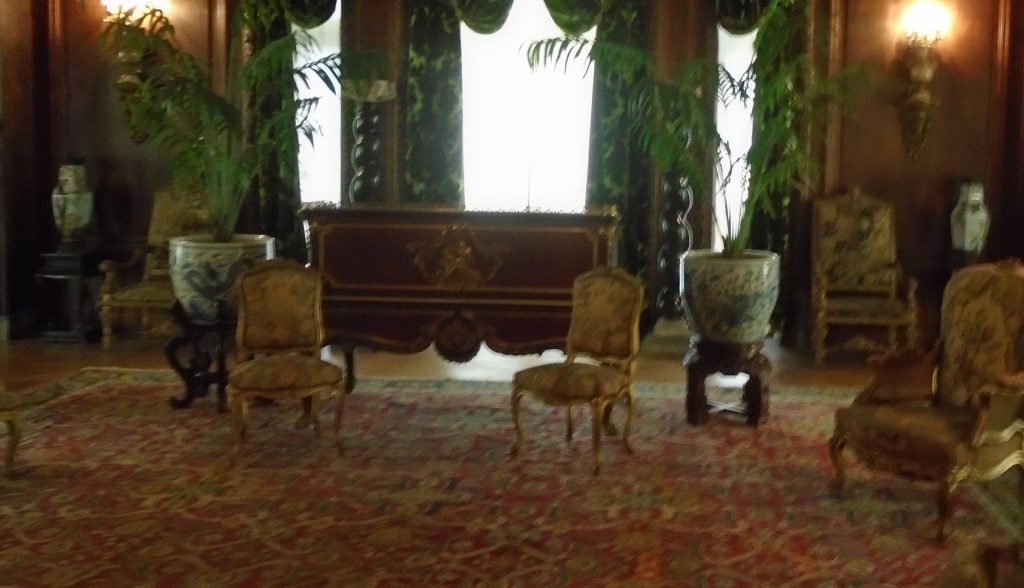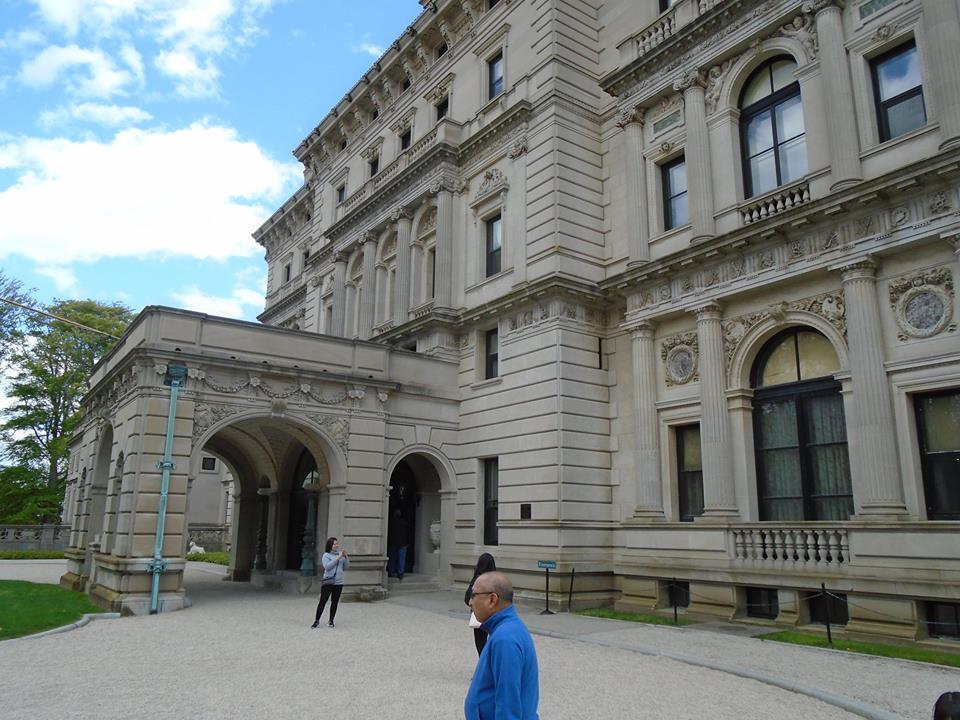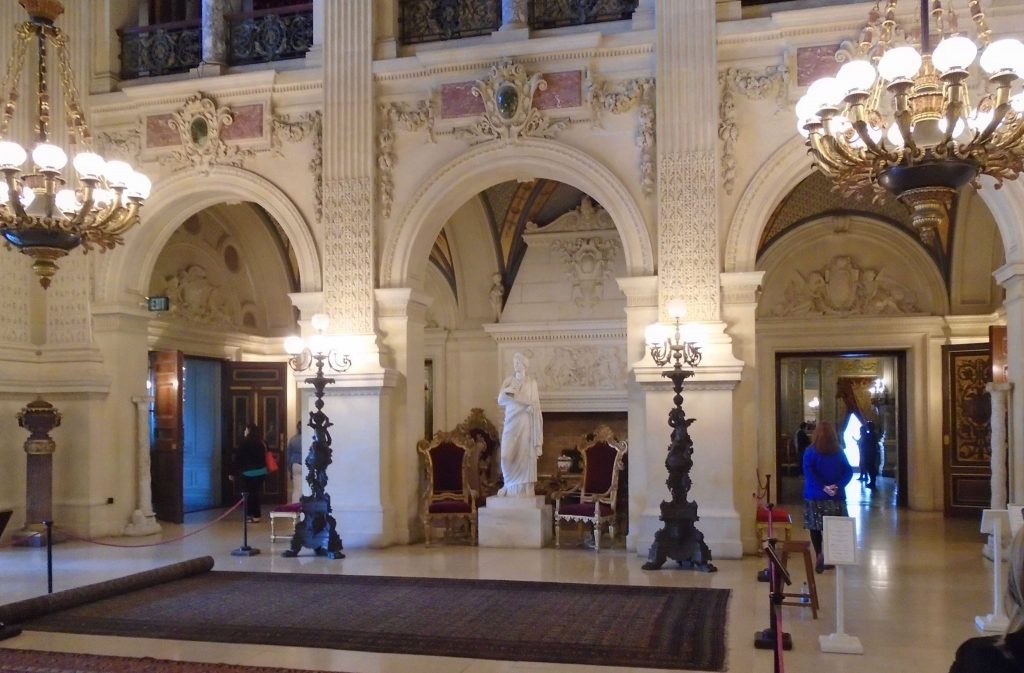Still in Newport looking at the mansions of the formerly rich and famous. Among the places we visited was “The Breakers” one of the Vanderbilt homes. I know it is fashionable to criticize these fat cats, but they did built fortunes and patronize the arts. Alfred Vanderbilt was aboard the Lusitania, torpedoed by a German U-Boat in 1915. After helping other passengers get into lifeboats, he gave his own life preserver and place in the boat to a young mother. I could not picture many of today’s rich celebrities doing something similar.
Anyway, I do not think it really was so much fun to be rich in the Gilded Age. Forget about the office work, parties were hard work. Keeping up with social engagements must have been deadly.
I met an ambitious young man a few years ago whose goal in life was to get rich. He was a smart guy and an extremely hard worker. He was on his way to success in his life venture when he died of a heart attack at the age of 42. Sic transit gloria mundi is only one lesson from his short life and not the one I thought most important.
“Why do you want to be rich?” I asked him, “What do you want so much?” He explained that the joy of being rich is that you would need to own almost nothing. It makes sense when you think about it. If you are really rich you can rent whatever you want, exactly what you want when you want it. Owning anything is a problem. When you are really rich you just use stuff.
My pictures show some of the opulence. The last picture is the bathroom. Consider, this is the home of one of the richest men in the world, but he still has a bathroom most of us would find inadequate. Progress is great. An ordinary guy today can live better overall than the rich guys of the past. Sure, you don’t have the opulent house, but you have TVs, computers and much better health care … and a better bathroom.
Next day
We are still in Newport, RI visiting mansions of the Gilded Age. Their palaces remind me a lot of hotels. There is lot of lobby there. No doubt these rich guys had it made, but if you compare their actual lifestyles – absent the status – with my lifestyle, I am much better off. I can travel faster and more freely. My medical care is way better. I have access to many more books than their libraries could hold. My entertainment options are much expanded. My bathrooms are nicer, my water cleaner and my clothes of higher quality. The last one, I know, will be surprising, but consider the no-iron cotton I can have among other things. Technological progress helps the poor much more than the rich, as the luxuries they had have become common to us today.
Consider the armies of servants these guys employed. What did they do? Most of them did stuff now done by machines or not needed. I mentioned the iron-free cotton. They had to employ lots of people to keep their clothes ironed.They had ice boxes stocked by servants. e have refrigerators that just work.
We are stayed at Marriott in Newport, pictured below. I have access to much greater luxury than Vanderbilt. My room is smaller than his, but more pleasant. I have better heat and air conditioning. My lights are brighter. I have TV and Internet and the materials are higher quality. When we drive away in our ordinary Toyota, it will be a much better vehicle than Vanderbilt could have owned. My car just works. Vanderbilt needed a team of servants to keep his carriages and car running. I will be able to drive over paved roads, instead of those bumpy trails he had to use. The technology I enjoy are worth dozens of his servants.
Before 1800, the whole world was poor. The Great Enrichment created lots of possibilities. The 20th Century was one of even greater material progress, more for the poor than the rich. I live better than Vanderbilt, but his lifestyle was not that much worse than mine. The poor of those days, however, were miserable. Lucky to be born in the 20th Century and in the USA. Everything else is just background.
My pictures show the Marriott lobby and the Vanderbilt mansion foyer (lobby). Vanderbilt’s is certainly more opulent. Marriott’s is more functional and, IMO, nicer.
Next Day
We went to a three more mansions today. I learned that Victorian homes were/are dark and that my camera does not take pictures well in low light, no matter how hard I try to hold still.
If you can cut through the envy, you realize that some of these fat cats were admirable. The one I liked is George Peabody Wetmore. His home was Chateau Sur Mer. His father made a fortune in the China trade, so George inherited the business and we cannot credit him with building wealth. He did maintain it and use it wisely. He was well educated and actively studied many subjects. He served in the Senate and as Governor of Rhode Island; he worked on the design committees of many of the monuments in Washington and on a variety of charitable causes. Recall that he did not NEED to do anything. He took his wealth and position seriously and worked to be a good man and a useful citizen, but often declined recognition and honors. Consider today’s rich and famous in contrast. Can we imagine Kanye or the Kardashians being useful and modest? Anyway, I enjoyed visiting his house and the grounds. He was a tree lover and the ground still feature a variety of fine trees. My pictures show some of them. First is an English oak. Next is a grove of Japanese cedars. Third are fern leaf beech and last is an English elm.





